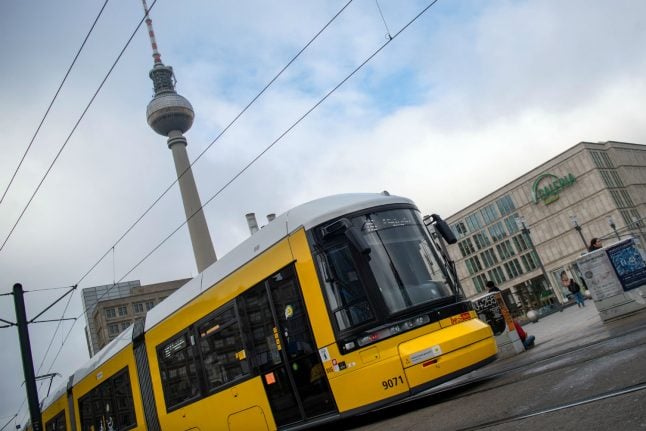On Monday, the capital’s transport company posted a video on YouTube asking viewers to vote for its inclusion in the list, which in Germany includes such cultural landmarks as the Cologne Cathedral and Bamberg’s old town.
So why should UNESCO's newest cultural contender be the BVG, a company notorious for overcrowding and rude service?
The company humourosly acknowledges its faults in its promotional video but points out that, in a rapidly changing city, the U-Bahn, trams and buses are the only places “where Berlin is still Berlin.”
READ ALSO: 10 must-see UNESCO World Heritage Sites in eastern Germany
‘No other city has changed as much as Berlin’
When the BVG announces its application in the video, an elderly woman immediately asks if the transport company is “komplett bescheuert” (completely stupid) to submit an application for UNESCO-status.
“Yes,” the video’s host says matter-of-factly. “But we’re doing it anyways.”
That’s why company has called on supporters to vote for its inclusion in the UNESCO World Heritage list, which has existed since 1975 to fund unique cultural landmarks around the globe, or to provide their own arguments on social media.
“No other city has changed as much as Berlin,” the host of the promotional video states.
It gives a run-down of examples. More and more cafes have servers who can only engage with their customers in English.
There is “a new trend” everyday, it states, as mouthwash is poured into shot glasses, and people of all ages strut through the streets donning quirky fashion.
“Yet there is one place where Berlin is still Berlin,” states the video. Of course that would be the BVG.
In a self-ironic fashion, it shows there are still delays, drivers who tell off passengers with a thick Berliner dialect for eating donor kebabs on the bus, commuters who curse at the closing doors as they narrowly miss their ride, and cramped quarters.
Up to now, only a few users have taken to Twitter and Instagram under the Hashtags #weltkulturerbebvg (#worldcultureheritagebvg) and under their own motto of #weilwirdichlieben (#becauseweloveyou).
While some social media users mocked the move to apply, praised the public transport company. “I wholeheartedly support that,” tweeted one.
Kraiiiisch…Oh ich unterstütze das voll und ganz #weilwirdichlieben #WeltkulturerbeBVG https://t.co/yyn1G3dxCh via @YouTube
— Muggeseggele (@RobbyBln) December 9, 2019
On Instagram, one user says that nowhere in the world could smell as good as the BVG – despite kebab, beer and bad weather – and that it must therefore become a World Cultural Heritage Site.
Others posted pictures of themselves with the photo filter developed to match the campaign.
To further promote the campaign, the BVG is offering merchandise items such as T-shirts or totes bags with “Machu Picchu, Taj Mahal & BVG” on them.
‘Of course this is meant seriously’
According to the BVG, the application procedure would take three years, and the state company itself considers its chances to be low.
“Obviously this is meant seriously,” said Petra Nelken from the BVG when asked by the Berliner Morgenpost if the entry was just a publicity stunt. “Of course the BVG should become a World Heritage Site.”
“Nope, no joke,” the company tweeted with the video.
Ne, kein Witz. pic.twitter.com/q5iqRzjIKk
— Weil wir dich lieben (@BVG_Kampagne) December 9, 2019
The company has set up a website asking public transport users how they feel.
“You have the choice: Do you want that we become a Cultural Heritage Site?” they ask site visitors, with yes or no as the only two options.
As of 5 pm Tuesday, close to 45,000 people had voted “yes” on the website.
Why does Berlin’s U-Bahn also deserve the title? Said speaker Markus Falkner: “That’s for everyone to decide for themselves.”
The transport company says it has already fulfilled the two points needed for UNESCO.
Firstly, it is, an “interface of human values in relation to technology,” it states. Secondly, it symbolizes “sections of human history”.
wholeheartedly/thoroughly – voll und ganz
joke – (der) Witz
We're aiming to help our readers improve their German by translating vocabulary from some of our news stories. Did you find this article useful? Let us know.



 Please whitelist us to continue reading.
Please whitelist us to continue reading.
Member comments